Starship first reached space on March 14, 2024, becoming the largest and most powerful rocket in human history to reach the stratosphere. Unlike the two previous tests, this time the Super Heavy first stage completed its task and separated successfully. The second stage, that is, the Starship itself, entered the planned trajectory and was able to open and close the cargo compartment. True, it cannot be said that the tests were successful. The Raptor engine was not restarted in a vacuum. Upon re-entry, the first stage disintegrated and exploded. However, overall the project has proven its viability. Not everyone understood that these were not ordinary tests of another new rocket, but truly the beginning of a new space age. To understand how grandiose the event is, it is enough to understand the size of the apparatus, which is what we will try to do next.
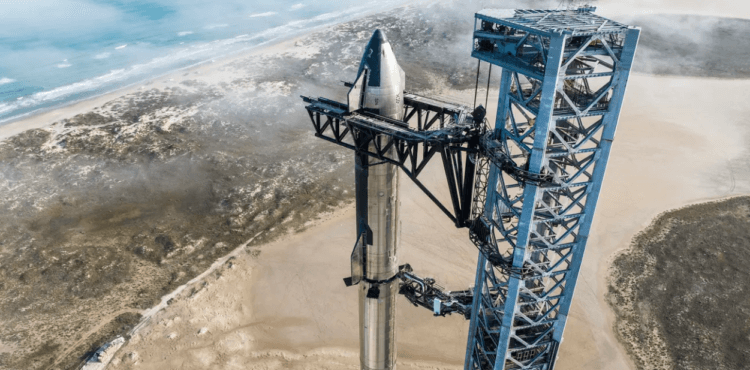
StarShip is the largest rocket in the history of mankind
StarShip SpaceX & #8212; the largest rocket in history
As we previously shared, StarShip is a rocket that will take people to the Moon and even Mars. As a matter of fact, this explains its gigantic size. It has two stages: the SuperHeavy booster, which carries the spacecraft into space, and the StarShip itself.

Against the background of the rocket, a person seems like just a bug
The total height of the two steps is 120 meters. The Peter and Paul Cathedral in St. Petersburg has approximately the same height along with its spire, which for a long time was the tallest building in the city. The rocket is also 40 meters higher than the Trinity Tower, the tallest tower in the Kremlin, and 30 meters higher than the Statue of Liberty in the United States. And if you put the rocket down, it will take up the entire length of a football field, since its maximum length is also 120 meters, and its minimum is 110 meters.
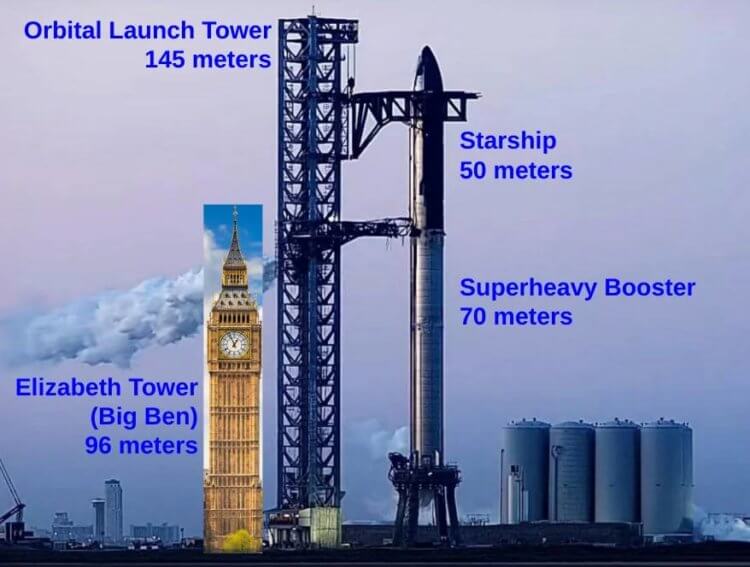 The launch mass of both stages is 5000 tons. For comparison, the International Space Station with all its modules is currently approximately 73 meters long. The width of the ISS together with solar panels is 109 meters, and the mass is within 420 tons.
The launch mass of both stages is 5000 tons. For comparison, the International Space Station with all its modules is currently approximately 73 meters long. The width of the ISS together with solar panels is 109 meters, and the mass is within 420 tons.
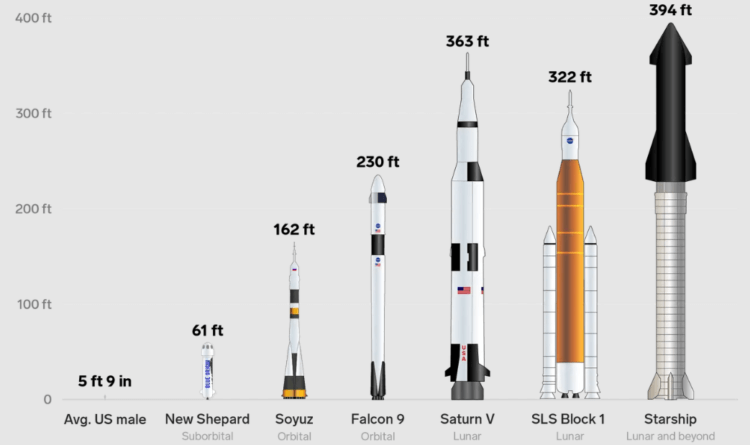
StarShip rocket is compared to other rockets
The first stage of Super Heavy has a height of almost 70 meters, which almost corresponds to the height of a 25-story building. The «Starship» has a height of 50 meters, which is comparable to the height of the famous Leaning Tower of Pisa.
Thus, StarShip can be called a “flying fortress” or a “space skyscraper.” Therefore, the very fact that the rocket took off and even reached space is an incredible success for SpaceX.
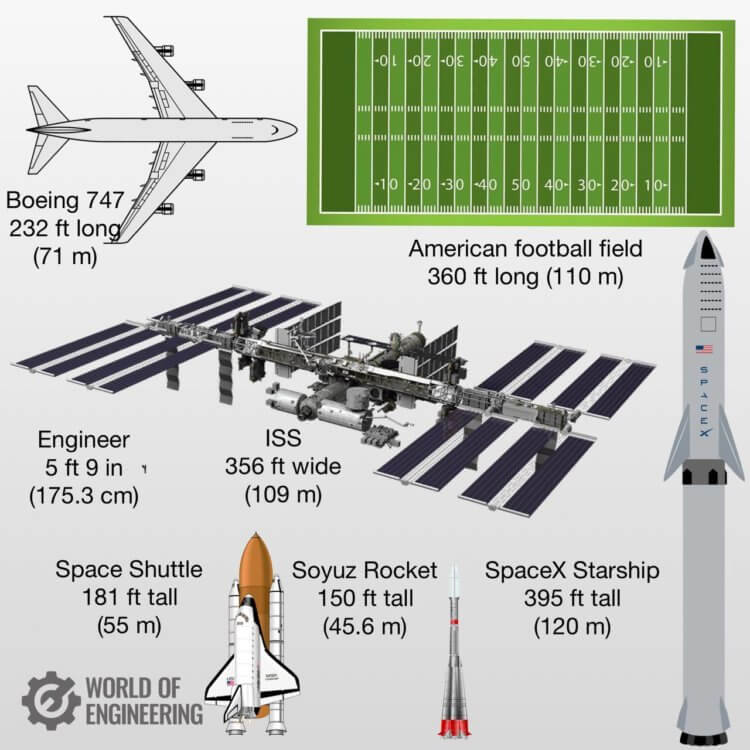
Comparison of the sizes of StarShip SpaceX and other large objects
Power of the StarShip rocket
The Starship-SuperHeavy rocket impresses not only with its size, but also with its power, unprecedented for the space industry. Super Heavy is powered by 33 new Raptor methane engines. Each such engine develops a thrust of about 230 tons at sea level. The Starship spacecraft itself is equipped with 6 engines: it has 3 Raptor engines and another 3 Raptor Vacuum engines.
The first stage with all engines running develops a thrust of 85,703 kN. For comparison, the thrust of the legendary American Saturn V rocket, which delivered astronauts to the Moon, was 34,343 kN. The thrust of the Falcon 9 rocket is only 7686 kN.
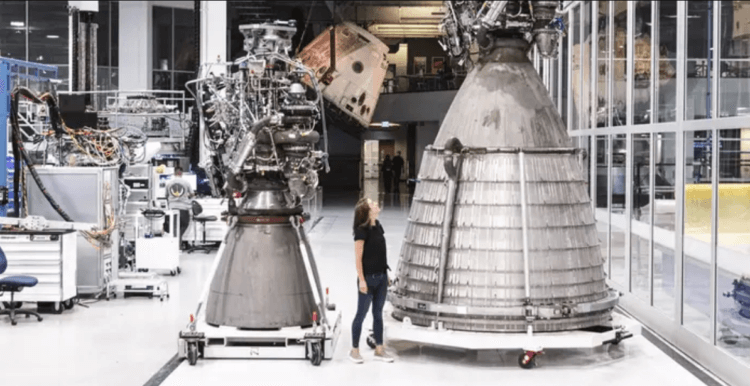
On the left is the Raptor engine, and on the right is the Raptor Vacuum
Thanks to this power, the rocket can deliver 100 people along with cargo to Mars. And the ship will be able to deliver cargo weighing up to 150 tons into low Earth orbit.
Some interesting facts about the StarShip rocket
Finally, here are a few more interesting facts about the StarShip rocket that you may not know knew:
— Both the Super Heavy first stage and Starship second stage will be returned and reused, significantly reducing the cost of launches. Both stages will make a vertical landing.
— According to SpaceX, Starship can be launched just a few days after landing and minimal preparation.
— Starship runs on environmentally friendly methane fuel, which can be produced on Mars from the atmosphere and subsurface ice of the planet.
— The body of the spacecraft is made of stainless steel, a non-traditional aluminum alloy used in most spacecraft.
— To return safely to Earth, the spacecraft will use a unique system of wings and tail surfaces for aerodynamic braking in the atmosphere.
Thus, StarShip can rightfully be called the most ambitious SpaceX project, which has practically been brought to life. This means that interplanetary flights await humanity in the near future.